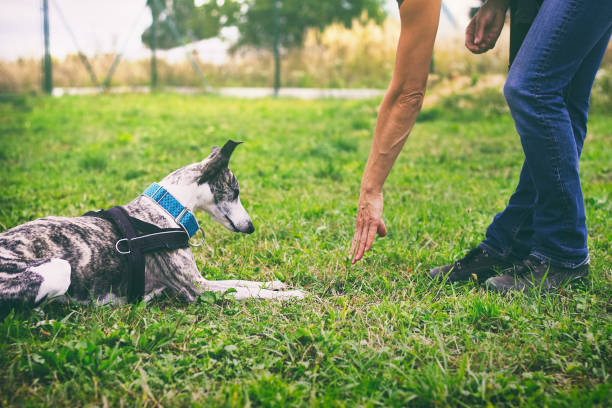Dogs exist as social animals and should stand prepared accordingly. Your dog will interact with people and other dogs when he is given the proper environment and socialization. Obedience training is a great way to help your dog learn to listen, behave and respect you as his owner. Dogs are natural learners. They learn quickly and easily, but they don’t always do what we tell them. That’s where obedience training comes in.
You must train your dog to listen and obey commands so that he doesn't end up doing something dangerous or destructive. That's where obedience training comes into play. The goal of obedience training is to teach your dog the skills necessary to behave predictably in any given situation. Dog Training in Mumbai suggests numerous advantages.
1. How Should You Train Your Dog?
There exist two common ways of teaching a dog. The first has been optimistic reinforcement, which awards your dog for accomplishing what you like. The second is negative reinforcement, which punishes your dog when he doesn't do what you want.
To train your dog with positive reinforcement, you'll need to teach him what you want him to do and then reward him with praise and affection after he's done it. If you want your dog to sit or stay, for example, all you have to do is teach him how by giving him treats when he puts his butt on the floor. Then when he puts his butt on the floor, give him more treats and praise because now he knows what you want him to do.
Negative reinforcement is harder because it requires you to use punishment or "discipline" as a motivator. For instance, if your puppy chews your shoes, don't give him treats or praise — just take away his favourite toy immediately after it happens so that he learns that chewing costs him something bad (like losing his favourite toy).
2. Understand How Your Dog Learns
Your dog's training begins with understanding how your dog learns. The type of intelligence you have with your dog will dictate how you train him. There stand three types of dog intelligence identified by scientists.
Instinctive Intelligence
Your dog has an instinctual drive to be a pack leader, and it's important to recognize that this is a very real part of him. If you want to get the best out of your pet, you need to understand how his instincts work and what makes him tick. You can't just take his behaviour at face value; if he is acting aggressively toward you, for example, it may be because he feels threatened by you or thinks that you are in danger. Understanding this will help you better understand why he does what he does so that when he does act aggressively towards other dogs or humans, it will be less likely that he'll do so again in the future.
Adaptive Intelligence
This type of intelligence involves learning through observation and experience rather than instinct. For example, if your dog has never seen a squirrel before and suddenly sees one run across the street, there is no way for him to know what sort of reaction would follow such a sight (i.e., maybe nothing).
Working and obedience
Obedience is a trait that dogs have been bred to develop over generations. It contains the ability to comprehend the consequences of their activities, such as following orders. Dogs who are not well-trained may growl or even snap at their owner during training sessions. This can live frustrating for both the teacher and the puppy. But if you can understand how your dog learns, you can teach him new skills in a way that he will understand.
Working puppies live those that have been trained as well as perform typical tasks for people. They may be used for hunting or guarding livestock or flocks of birds. Working dogs usually learn quickly because they need to perform tasks that require precision, speed and attention to detail – just like humans do.
It's no surprise that when we feel about Dog Boarding in Mumbai we instantly judge it. We're here to help you provide your pup with the best care possible!
3. Obedience Training Rewards
Dogs are the best pets, but they can also be the biggest problems. If you're a dog owner and you want to train your pet to obey commands, then you'll need to find an obedience training rewards program that works for your dog.
Obedience training can stand as a fantastic way to encourage your dog and train his new behaviour. It can also help you avoid the pitfalls of strict behavioural modification, which can be overwhelming and difficult to maintain. Obedience training rewards your dog with the opportunity to do something good, or get something they want. This way, they'll have the incentive to learn behaviours that you find important.
4. Control Consequences Effectively
Dogs are naturally curious, and they can be very willful when it comes to finding out what's going on. This can be a problem for your dog when you're trying to train them, because if he doesn't understand how to behave in certain situations, he may not listen when you tell him not to do something.
You can use control consequences effectively by rewarding the dog for being good during training sessions. You'll want to take advantage of the fact that dogs love praise and treatment, so make sure you give him plenty of both as soon as he does something right.
5. Training New Skills
When you’re training your dog something new, recall that they keep the concentration span and brightness of a two-year-old. Your training sessions should live fast and to the end. Limit them to 15 minutes. Concentrate on one job or conduct so that they accomplish not become disconnected.
Make certain that you’re utilising the exact orders for the manners that you want. If you utilise the same phrase but insert it into penalties differently. Also, every time you say it, your dog may not comprehend. For instance, if you like to train your dog to lie down, you will mistake them if you tell “Lie down” during one session and then tell “Fido, lie down or no treat” last in the day. They power not know what to accomplish. Dog Grooming in Mumbai is the finest location for your dog.





0 Comments